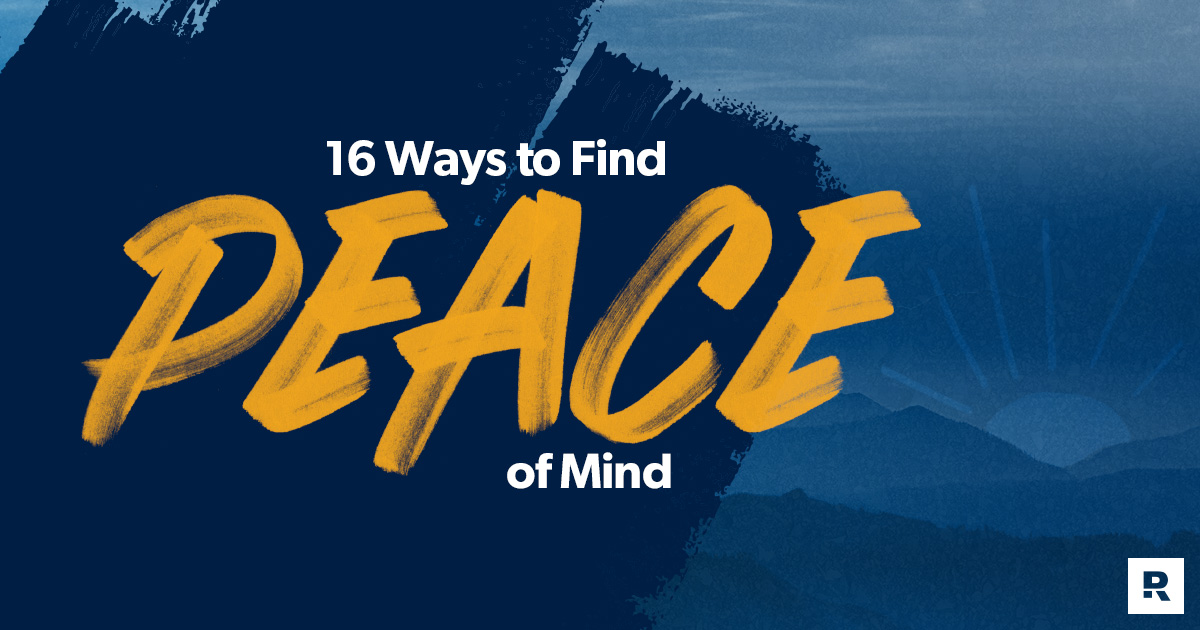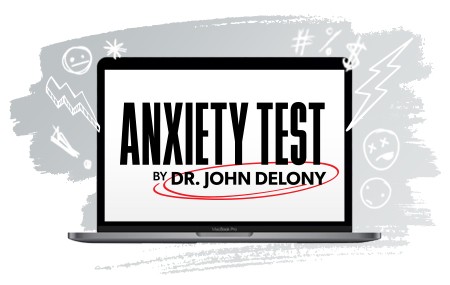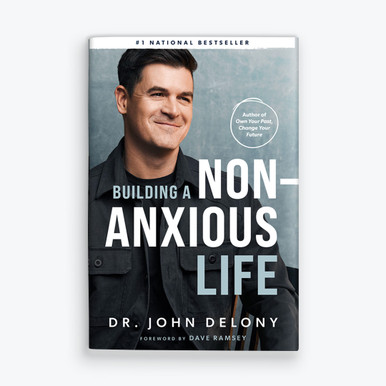16 Ways to Find Peace of Mind
9 Min Read | Apr 25, 2024

The most important thing I can tell you about your peace of mind is this: It’s not situational. A lot of us look for peace of mind by trying to predict the future, by controlling everything and everyone, or by putting our faith in a political candidate who makes us feel safe.
But when we try to anchor our sense of well-being to an ever-shifting, chaotic world, we will constantly feel anxious and unsettled.
True peace of mind is not contingent upon circumstances. It’s a way of being—a choice to rise above your situation. You have to be a person of peace and choose to live a life of peace, which paradoxically means you have to be ready to encounter difficulty. And the best way I know how to do this is to have practices that prepare you for life’s challenges when—not if—they come. Think of these practices as rebar—the metal rods embedded in concrete that keep it strong and structurally sound.
With that in mind, let’s talk about a few of the best practices for becoming a person of peace.
1. Face uncomfortable truths head on.
Finding peace of mind isn’t about erasing every uncomfortable emotion or thought. It’s about braving the rapids for stiller waters. Numbing, suppressing and avoiding disappointment and anxiety will only make everything worse. Don’t run from or judge your feelings. Instead, be compassionate and curious. Sometimes, simply giving yourself permission to call it like it is will allow you to feel tremendous relief.
2. Journal.
Journaling is an excellent practice for unearthing what’s going on in your heart and mind. Get your swirling, chaotic thoughts out of your head and onto paper. Just sit down with a blank sheet of paper and write. Word vomit all over the page. Don’t edit yourself. And don’t lie or hide from yourself. The goal isn’t to be pretty or eloquent or even make sense—it’s to get in touch with what’s going on inside your head.
3. Connect with people you love and trust.
You cannot do life alone. Period. Healthy relationships are the foundation for a still mind and overall wellness. You need people. When you’re feeling stressed, anxious and lonely, go to someone who will listen to you, love you, and just be with you. Human connection is one of the most powerful antidotes to that low-grade anxiety that might be robbing you of your peace of mind.
4. Be active.
One of the best ways to get stress out of your body is to be active. Lift weights. Ride a bike. Join a team. Do anything you can to be active. Exercise will clear your mind and heal your body unlike anything else.
I love lifting weights in my home gym and getting outside in the woods and creeks with my kids for ridiculous adventures. I like going to jujitsu classes, playing church-league basketball, and taking long bike rides. For you, it might be playing soccer in the yard, crushing it on a rowing machine, or hiking. The best exercise plan is the one you’ll do.
5. Spend time outside.
Be outside whenever possible. Get a blanket if it’s cold or wear shorts if it’s too hot. But get outside. Nature is healing and restorative for your heart, mind and body. Put your bare feet in the grass, listen to the birds, take a hike, sit by a lake or a river and just breathe in the air.
6. Sleep.
Getting a full seven to nine hours of sleep every night is ridiculously important because sleep fixes so many health issues—including stress and anxiety. Sleep is about as close to a silver bullet as you can get.
Want to build a non-anxious life? Learn how in Dr. John Delony’s new book.
If you have trouble actually getting to sleep because your thoughts are spinning, create a wind-down routine an hour before bed where you get off technology, dim the lights, take a relaxing bath, take pure supplements (not medications), read a good book, and meditate and journal to help calm your mind.
7. Eat well.
Along with sleep, nutrient-rich foods are a foundational pillar of health. There’s no such thing as “mental health” and “physical health.” It’s all just health. And food has a direct impact on your mood, as well as your body’s ability to function, respond and recover. A diet that’s high in sugar and processed foods and other trash will contribute significantly to your anxiety levels. Be a good steward of the one body you have and eat well.
Free Anxiety Test
This test will help you get clarity on the situations that could be contributing to your feelings of stress, anxiety and burnout.
8. Practice forgiveness.
Unresolved conflict can be a huge source of anxiety. Do you need to forgive someone for the hurt they caused you? Do you need to forgive yourself for a mistake that haunts you? Unforgiveness leads to bitterness, and it’s been said that bitterness is the poison we drink hoping someone else will die. Don’t carry the bricks of bitterness or anger. Set the bricks down. Choose to forgive.
9. Listen to music.
Music is healing for the soul—whether you’re jamming to ’80s hair metal (one of my personal favorites) or some lo-fi beats to create some Zen. Find a playlist or an album that brings you joy and turn up the volume.
10. Do something creative.
Creativity is a remarkable outlet for stress relief and peace. I love this quote from Brené Brown: “Unused creativity is not benign . . . It metastasizes into resentment, grief, heartbreak.” Is there a creative outlet you’ve been missing? Dust off your guitar. Start that business. Plant a garden. Cook a meal for your neighbors.
Getting lost in a good novel is another great way to increase creativity. Pick up a book and give your brain a break from problem-solving mode.
11. Practice gratitude every day.
I keep a gratitude journal every single day. I know this feels cheesy and Pinteresty, but it’s powerful and transformative. Anxiety keeps us fixated on past experiences or worried about future ones, but gratitude is grounding because it centers us in the present. It reminds us to stop complaining and whining and internalize our blessings.
Write down five things you’re grateful for, beginning with “I’m grateful for . . .” Gratitude is a foundational practice for a life of peace. Bonus points if you do this twice a day: when you first wake up and right before you go to bed.
Building a Non-Anxious Life
12. Pay attention to and redirect your thoughts.
I don’t know about you, but the more stressed I become, the more I lose control of my thoughts. If I don’t step in, my brain starts to spiral, with unwelcome and frightening thoughts spinning faster and faster.
Ruminating (thinking the same things over and over) and worrying make us feel like we’re doing something important. We get a false sense of accomplishment from these mental scenarios: preparing for the worst, rehearsing disaster, or practicing imaginary hard conversations we’ll never have in real life. Hear me clearly: Ruminating and worrying are a complete waste of time. They do nothing except leave us feeling more helpless and anxious.
But here’s the exciting thing: We can learn to control our thoughts. We get to decide where we fix our attention. Pay attention to the thoughts running through your mind and redirect them to something actually true and pleasant and good to think about. (And if you need help identifying what areas of life might be leading to feelings of stress or anxiety, check out my free anxiety test.)
13. Try a meditation.
Okay, I know what you might be thinking: Meditation is a woo-woo practice for yogis and granola people that only eat kale. But in reality, meditation is the practice of paying attention to and controlling our thoughts. It’s learning where your body and your mind connect and how you can take a bird’s-eye view of your desires. It’s a game changer. My team and I put together a free meditation that will help you find peace of mind.
14. Clear up your schedule.
You cannot outrun or outperform your anxiety and depression. Being rushed and overcommitted will destroy your peace of mind. Are you too busy? Stressed out by commitments you can’t keep? Look at how you’re spending your time and find things you can say no to. Slow down, create boundaries around your calendar and find time to breathe.
15. Throw your screens out the window.
Okay, not really. But maybe. Our devices are stealing our attention, our joy and our ability to be present with ourselves and with others. I don’t propose that we all go off the grid and live in the woods without electricity or smartphones or plumbing. I’m writing this article on a laptop, and I just posted some quippy saying on Instagram. For most of us, technology is an important tool for our work and our lives. But I’m certain of the fact that we need to have major guardrails around technology use.
Reevaluate your relationship with technology. Is it serving you, or are you serving it? Treat your attention as your most important commodity. Treasure it. Value it. Protect it.
16. Pray.
I’m a Christian guy, so prayer is important to me. It might not be for you, and that’s okay. But if you’re a person of faith, I encourage you to make regular time to pray and calm your spirit. I also like to write a Scripture verse on an index card (yeah, I’m old school like that) and carry it around with me throughout my day.
Regardless of your faith tradition or your relationship (or lack of) with God, we must all internalize one important truth: The universe does not revolve around you. Or me. We’re small, and our time on earth is short. There are much bigger things going on. Prayer reminds us to sit in our smallness and helps us remember that we all need help getting through each moment.
A Long-Term Solution for Finding Peace of Mind
Most of the time, our general sense of unease or stress or guilt stems from unresolved anxiety. It’s like a low-grade fever. It’s your brain and body’s way of letting you know something is off.
But here’s what’s exciting: Once you lean in and pay attention to the root cause of your anxiety, you can begin to make deep, lasting changes for healing. Please go all in on this! There are so many resources for you to learn how to live a more peaceful, joyful and non-anxious life. You are worth being well.
Next Steps to Find Peace of Mind
- Learn more about what anxiety is and how to deal with it.
- Check out my new book, Building a Non-Anxious Life.
- Take my free Anxiety Test to learn which areas of life might be contributing to feelings of stress and anxiety.




